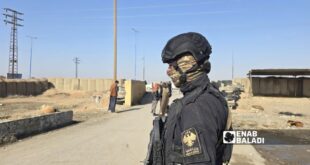EL FASHER (AFP) — US Secretary of State Condoleezza Rice demanded and received an apology from Sudan Thursday after officials and press accompanying her were “manhandled” by security staff at President Omar Bashir’s residence.
“They had no right to manhandle my staff and the press,” Rice told reporters after the incident, in which US officials and reporters were violently barred from entering the meeting and security staff tried to confiscate press tapes.
“It makes me very angry to be sitting there with their president and have this happen,” said Rice, who was in Sudan to urge Khartoum to step up efforts to end what she calls genocide in its battered western Darfur region.
Jim Wilkinson, senior adviser to Rice — who flew straight from the meeting to Darfur — said “she told them to apologise before we land in Darfur.”
After landing in El Fasher, capital of North Darfur state, Rice Spokesman Sean McKormack said she received a personal phone call from Foreign Minister Mustafa Osman Ismail “apologising for the treatment of our delegation and the press corps accompanying the secretary.”
Wilkinson said he was grabbed and thrown against the wall at the entrance to Bashir’s residence before he bulled his way through with Rice’s personal assistant in tow behind him.
In the melee, US Assistant Secretary of State for African Affairs Connie Newman was initially barred from entering the meeting, as was Rice interpreter Gamal Helal.
“Freedom of the press is a wonderful thing and we don’t appreciate being manhandled at the front door,” a fuming Wilkinson told reporters.
The Sudanese finally relented and let in the American press in two waves — although Wilkinson was seen waving an angry finger at the foreign minister.
A Sudanese official quickly came out to apologise to the second group of journalists, held back in the anteroom to the residence.
“It is not our intention in any way to bar the press from doing its job,” said Khidir Haroun Ahmed, chief of the Sudanese mission to the United States.
Rice was in Sudan — a country under US sanctions and still branded by Washington a state sponsor of terrorism — as part of a five-day trip that has already taken her to Senegal and that is to end in the Middle East.
Rice said she expects decisive movement from Khartoum to end the fighting in Darfur, stressing Washington still considered the conflict to be “genocide.”
Bashir said at the beginning of the meeting with Rice that “we do not want to go back to war in any part of the country,” but an official present for the entire meeting said he was noncommittal about disarming the government-backed Janjaweed militia.
The government’s proxy militia has been accused of murder, torture, widespread rape and other human rights abuses against the civilian population.
Some 300,000 people have died so far in Darfur, mostly civilians, and more than two million displaced what the United Nations has described as the world’s worst humanitarian crisis.
After he bid Rice farewell at Khartoum airport, Ismail hailed her visit as “a positive sign towards improving relations between our two countries.”
He made no reference to the earlier violence.
“The government gave Mrs Rice two written notes. One is a proposal to stop violence against women in Darfur and the second one deals with the necessary steps to normalise relations between the two countries,” he added.
He said Rice had suggested way to end violence in Darfur and asked that a new round of negotiations between Darfur rebels and Khartoum be moved forward the scheduled date of August 24 in Abuja, Nigeria.
Ismail said Rice had “promised to study a government demand to lift US economic sanctions against Sudan.”
“She said the lifting of sanctions would be gradual.”
US officials, however, said Rice had said she would look at the matter but gave no firm commitment.
She later said, while visiting Darfur, that she had some sympathy with Khartoum’s argument that sanctions must be lifted to allow for rebuilding the railroad system to speed food aid and access airplanes to transport displaced people.
“Obviously, if there is a case on the humanitarian side I think we’d be willing to look at it,” she said, adding that the request had to be reviewed.
In Darfur, Rice spent about an hour and a half visiting the Abu Shuk camp where she spoke to aid workers and women victimised by violence.
Afterwards, in a series of broadcast interviews with refugee children at her feet, Rice recounted how she took a firm line with Khartoum over its need for greater effort to end the Darfur crisis.
“I told them they have a credibility issue,” she said. “I told them there is a gap between what they have said and what they have done.”
But she added that with the formation of a new national unity government formed earlier this month in line with a key January north-south accord, Khartoum “needs to take this as an opportunity to make a new start.”
Rice met former southern rebel and now first Vice President John Garang while in Khartoum.
 Eurasia Press & News
Eurasia Press & News



